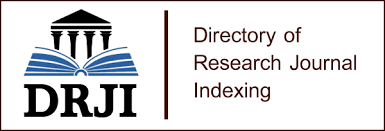ESL/EFL LEARNERS’ POOR PERFORMANCE IN ENGLISH: THE FACTORS
Abstract
This paper deals with the factors that are responsible for the ESL/EFL learners’ poor performance in English. The study was conducted in Bangladesh in nine selected secondary institutions from three different districts (i.e. Dhaka, Khulna, and Satkhira) covering urban, suburban, and rural areas. Data were collected through closed type questionnaire survey from students, and unstructured interview of the teachers. To collect and analyze the data, both qualitative and quantitative approaches of research were used. It was found from the study that so many factors lied for the ESL/EFL learners ‘poor performance in English like learners’ psychological factors, teachers’ factors, factors related to teaching procedures, teaching and learning environment, syllabus and curriculum.
Â
References
Azam, M. G. (2012). Factors affecting student’s English achievement at secondary level in Bangladesh: The comparative study of Narayanganj and Bhola sadar upazilla (MA dissertation), Hiroshima University.
Basu, B. L., & Bhowmik, S. K. (2005). Working with learners’ motivation and success in EFL language programme: Tracing the sources of low motivation and a learner centered approach. Harvest: Jahangirnagar Studies in Language and Literature, 20, P. 131-145.
Ellis, R. (1994). The study of second language acquisition. Oxford: Oxford University Press.
Khan, H. R., & Akter, M. Z. (2011). Students’ mistakes and errors in English writing: Implications for pedagogy. Dhaka: East West University Research Report.
Krashen, S. D. (1982). Principles and practice in second language acquisition. Oxford: Pergamon Press.
Krashen, S. D. (1985). The input hypothesis: Issues and implication. NY: Longman.
Krashen, S. D. (2002). Second language acquisition and second language learning. USA: University of Southern California.
Larsen-Freeman, D. (2000). Techniques and principles in language teaching (2nd ed.). New York: Oxford University Press.
Maniruzzaman, M. (1997-1998). The SL/FL classroom and the individual learner. Harvest: Jahangirnagar Studies in Literature, 14, p. 87-102.
Osunde, A. U. & Ogiegbaen, S. E. A. (2005). An assessment of factors associated with students’ poor performance in senior school certificate English language in Nigeria. Language in India. Retrieved from ///F:/Thesis/net doc/Language in India.htm (20 May 2014)
Additional Files
Published
How to Cite
Issue
Section
License
Copyrights for articles published in Journal of Asian and African Social Science and Humanities are retained by the authors, with first publication rights granted to the journal. The journal/publisher is not responsible for subsequent uses of the work. It is the author's responsibility to bring an infringement action if so desired by the author.
Articles published in Journal of Asian and African Social Science and Humanities are published under the Creative Commons Attribution (CC-BY) license, which permits others to distribute, remix, tweak, and build upon your work as long as they credit you for the original creation.
Â














